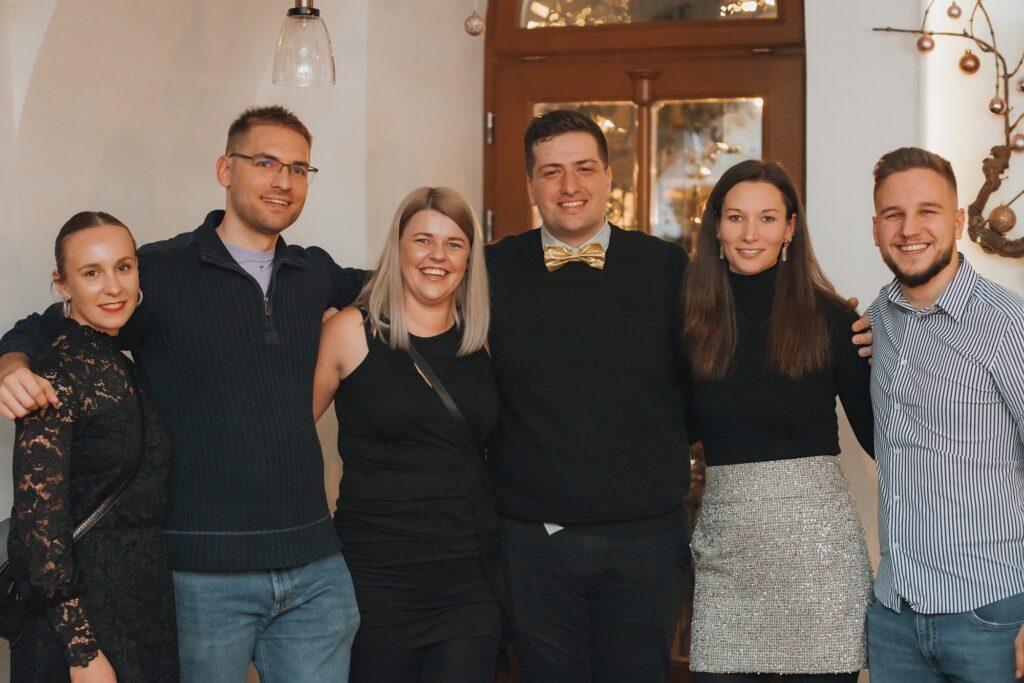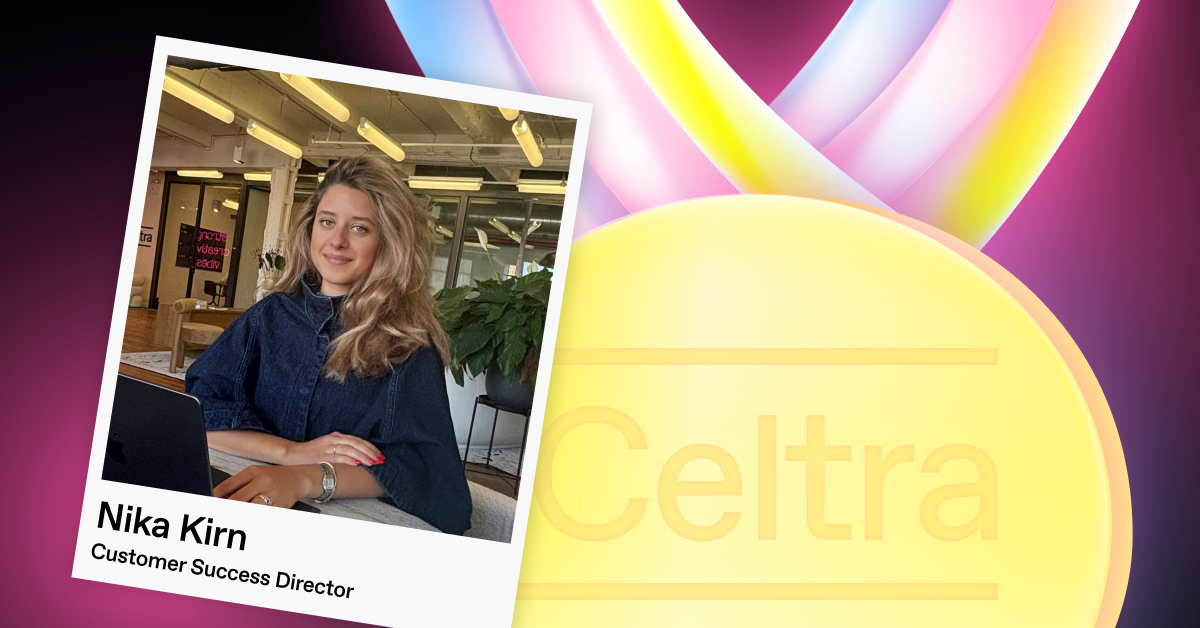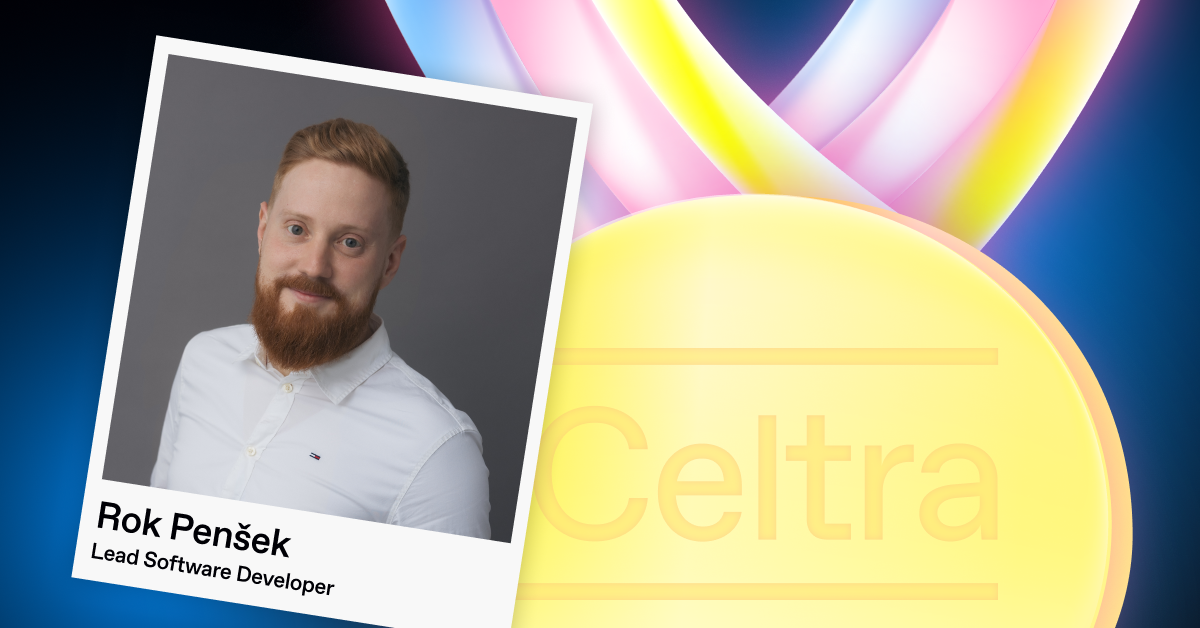Some careers are built on instinct, others on numbers. For Vid Stropnik, it’s both. With roots in PR and event management and a master’s in machine learning, he brings storytelling and statistics together in his work as a data scientist at Celtra. Read on to discover how he found the best of both worlds.
What sparked your interest in engineering, and how did your career path unfold from there?
While I chose to study engineering at university, my early professional background is actually in PR, event management, and marketing. It’s a gross simplification of that profession, but I had always treated it as my job to understand what makes people tick. Good marketers, I thought, had a feeling for it. For me, it was an art, not a science.
The Introduction to Data Science at uni turned that belief on its head. Through simple measurements, we were able to show patterns in social phenomena – that cultural alliances drive Eurovision votes, that it’s really easy for Netflix to anticipate your next binge obsession, that only a few factors can predict the happiness level in different countries… I was smitten with the notion that, if only I could parametrize the world, I could understand it. Gone were the days of doing things by feel.

I pursued Data Science and Machine learning for my Master’s degree, and I started incorporating my new knowledge into my jobs and hobbies—I coordinated a European-funded project for anomaly detection and disease prevention in viticulture, I made an AI agent that was undefeatable in my favorite board game…, and in short, I was becoming a bit more left-brained every day.
As part of my coursework, I also participated in the Data Science Project Competition, sponsored by Celtra. The intersection of marketing and data immediately felt like a great fit for me. But it was in working with online advertising data for the first time that I started to trust that old feeling again – making the right hypotheses, but having the know-how to test them diligently was a winning combination for the competition. “Best of both worlds”, in the words of a great American poet. Before I knew it, I was in a job interview, and then, the Celtra office!
What are the top 2–3 traits that make a great data scientist, and why?
Curiosity & doggedness would be the first two. When conducting exploratory data analysis or evaluating the performance of a statistical model, just plotting out the results of your initial query is often only the beginning of your task. Being inquisitive and asking why these results occur is where the wheat is separated from the chaff. And then doing that again. And again. And again… for as long as it takes, until you can be reasonably confident in the answer you’re trying to present.
The final trait is less universal, as data scientists come in different shapes and sizes. For me, they need to be a good storyteller; as uncovering crucial data patterns is only half the battle of (convincing stakeholders to consider) making data-driven decisions.
What does a ‘typical’ day look like as a data scientist at Celtra?
My days are quite varied. I start some of them with a bi-weekly sync with my team, which allows us to realign priorities. I don’t strictly follow tickets from a sprint board, as we often surface ad-hoc questions that I tend to prioritize. That means querying our database and employing statistical tools to get the right answers to the right people, which, in turn, means intervals of heads-down work and meetings with the right stakeholders.
In cases where no such urgencies arise, I usually have a suite of experiments in the backlog, where I try and make considerable progress towards a grander goal (e.g., retraining & improving a machine learning model, cleaning up a dataset query).
What are the biggest challenges you face in your role, and how do you tackle them?
Back to the point about doggedness from above; the repetition of experiments can get tough, and sometimes, the lack of any signal in the noise can be quite discouraging – especially in a fast-paced environment where constantly hitting dead ends can mean a perceived lack of effectiveness. My favorite way of tackling a waning supply of either ideas or motivation is to talk to my team. I have the luxury of working with some very sharp minds that have a knack for reframing the problems that I’m working on, and reigniting the desire to get to the bottom of them. In lieu of that, just getting some fresh air works too.
How has your role evolved since you joined Celtra? Any big pivots or surprises along the way?
Yes actually! I initially joined the data insights team, the caretakers of Celtra’s internal & external reporting infrastructure and safekeepers of our data warehouse. It was a great place to start for me, as that team touches all aspects of the business: from tracking our product feature usage to answering client queries and understanding our financial forecasts. It gave me a good understanding of the types of questions that arise in different departments in Celtra. It was a good place for building that intuition that data scientists rely on so much.
However, Celtra made a big bet on incorporating AI into its product in recent years, and I was whisked away towards product development. I’m currently working on scoring the quality of advertising creatives before they ever go live.
What do you love most about your job, and what makes Celtra stand out as a place to work?
I took a look at our website to see how my coworkers responded to this question and if it would be too much of a cliché to say that it’s the people. Even with overwhelming evidence (See Pia, Mitja, Iztok, Pero), I still had to go for it! The folks here are incredibly capable, knowledgeable, diligent, witty, loyal, and empathetic. I feel like I do my best work in a workplace that encourages self-expression (of one’s unique abilities, and the wrinkles of their character!) and fosters inherent trust and belief – both between peers and from management. We have that in spades here.

What’s the one tool or habit that keeps you sane and productive?
“Flow state engineering” does work on me to some extent. Lo-Fi beats or white-noise tracks to hush the mind, a quick stretch or dancing before a big presentation, and a full water bottle always within reach… I rely on all of those from time to time.
But, rather than robotizing myself completely, I feel like just staying true to myself and embracing productivity lulls is what aids my long-term value as an employee the most. Internalizing this belief has been my ultimate tool. When I’m not firing on all cylinders, I grab a teammate for a five-minute chat, sketch out ideas on a piece of paper, or research something that I’d been curious about for weeks. Moving the needle (even in initially unseen ways) on a low battery is the best way to stay productive.

What’s something about your role that most people misunderstand?
In my role, I’m very much involved in defining the problem we’re trying to solve – and it’s my responsibility to fully understand how the data I’m working on comes to be; formalizing these problems isn’t offloaded to the domain specialist. The (perceived) sexy part of the job (i.e., training machine learning models) is something we maybe spend 10% of our time doing, which surprises some people.
There’s a broader myth about research roles, too. We’re not lone geniuses waiting for a Newton-like apple-to-head epiphany on a random Tuesday. Research is still laborious: sticking to a roadmap, running the planned experiments, and writing up the results. It’s far more structured and less airy-fairy than folks sometimes assume.






